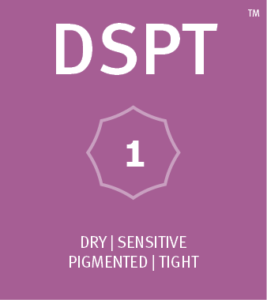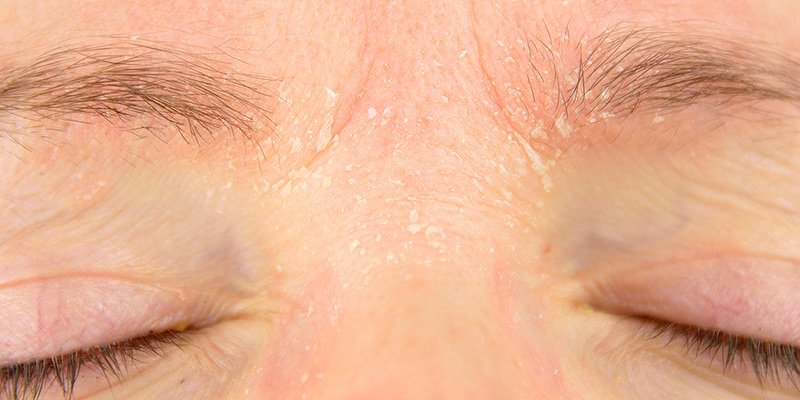Baumann Skin Type® DSPT: What You Need to Know

DSPT skin types require diligent maintenance in order to achieve an even healthy skin tone with good hydration and resistance to environmental insults. Without correct and consistent daily care, DSPT skin can suffer from various afflictions. The good news is – you can improve your skin type by using the correct and consistent daily skin care. DSPT’s have good lifestyle habits and/ or youth on their side so making a change now can have huge benefits.
What Is DSPT Skin Type?

DSPT skin is Dry, Sensitive, Pigmented, and Tight, which explains why this skin type can be tricky to manage. Not only is your skin dry, but it can also be easily irritated by many different ingredients, making a bit tricky to find the perfect skincare routine. Many people with medium-tone skin have this skin type, including people of Latin American, Spanish, Mediterranean or Middle Eastern descent.
The Most Common Problems for DSPT Skin
First and foremost, DSPT skin has an impaired barrier which leads to dryness manifested as roughness, lack of radiance, flaking and the appearance of “ashiness.” The dryness gets worst when humidity levels drop as cooler, drier winter air begins to move in. Repairing your skin’s barrier to prevent water evaporation from the skin’s surface with the correct barrier repair moisturizer is essential. Creams rather than light lotions and serums are a good option for you.
Eczema
DSPT skin has an impaired skin barrier resulting in increased evaporation of water from the skin’s surface that is known as transepidermal water loss (TEWL). Increased TEWL makes DSPT skin types susceptible to eczema. Also known as atopic dermatitis, eczema is a severe form of dry skin that shows up as patches of red, flaky skin anywhere on the body. These patches of dry skin can be very itchy, but scratching them will only make matters worse and lead to infection. Using the proper skincare products can help alleviate symptoms. If my recommendations do not do the trick, visit your dermatologist because many new eczema medications are coming into the market.
Acne
DSPTs often suffer from acne. Acne medications are not well tolerated by skin that has an impaired barrier because the medications used to treat acne were developed for oily skin types and can be extremely irritating to those with dry skin. The proper barrier repair cleansers and moisturizers must be used in conjunction with acne medications to clear up acne without triggering eczema or skin irritation. Every single product that you use in your skin regimen plays an important role and should be chosen carefully.
Uneven skin tone
DSPTs are susceptible to inflammation whether it is acne, rosacea, allergies or eczema. Inflammation is a complex process involving many pathways that all lead to activation of the cells that produce pigment called melanocytes. When melanocytes produce melanin- a brown/black pigmentation occurs. DSPTs are susceptible to developing uneven pigmentation in areas of previous pimples, eczema or other inflamed areas. This production of pigment is even more likely when the skin is exposed to the sun, so sunscreen and sun protection are paramount.
How to Care for DSPT Skin
The most effective skin care routine for DSPT Skin Types will focus on 3 issues: 1) building the skin’s barrier by preserving natural lipids and replacing ceramides, fatty acids and cholesterol in the skin; 2) reducing inflammation; 3) preventing skin pigmentation. Click here to see my current favorite products for your skin type.
- Cleansers: Stay away from foaming cleansers, as these contain ingredients that strip vital lipids from your skin. Instead, use creamy cleansers that deposit nourishing fatty acids (lipids) on your skin.
- Treatment products: A treatment product to treat your underlying skin problem that is leading to inflammation should be used after cleansing the skin. This product could be targeting the cause of acne, eczema, rosacea or other skin diseases that are causing your skin to develop damaging inflammation. This product is often a prescription product.
- Skin Brightener or Lightener: If inflammation has led to uneven skin tone with dark patches known as melasma or postinflammatory hyperpigmentation, skin brighteners designed to reduce skin pigment can be used. Options include PCA Skin Pigment Gel, SkinMedica’s Lytera, and a variety of prescription formulations.
- Moisturizers: Barrier repair is essential for your skin types so use moisturizers that contain the exact ratio of ceramides, fatty acids and cholesterol that have been proven to repair the skin’s barrier. Look for moisturizers with MLE Technology that combines these 3 crucial lipids in a maltese cross structure that mimics the natural skin barrier. MLE Technology is found in Zerafite Barrier Repair Moisturizer and Zerafite Ultra Rich Body Cream.
- Sunscreen: Sunscreen is vital to prevent the uneven pigmentation that follows inflammation, however, some sunscreens can cause acne in DSPT skin types. To find the most up to date sunscreen options for your skin type, click here.
Dos and Don’ts for DSPT Baumann Skin Types
DO:
Use barrier repair moisturizers such as those with MLE Technology
Use products with anti-inflammatory ingredients such as argan oil, niacinamide, and grape seed extract.
Wash your face after rinsing out your hair conditioner to remove any residue from skin
Choose anti-inflammatory oral supplements or foods with flax seed oil, omega 3 fatty acids or zinc
Add foods high in linoleic acid to your diet such as pumpkin seeds and walnuts
Add foods high in Vitamin A such as sweet potatoes, kale and carrots
Sleep 7 hours a night to decrease stress
Do an hour of stress relieving activity daily such as yoga
DO NOT:
Use foaming cleanser, shampoo and bubble bath with detergents like sodium lauryl sulfate
Use moisturizers that are not designed for barrier repair
Forget your daily sunscreen
Use products not specified in your carefully prescribed regimen
Eat a lot of sugar and dairy products if you get acne breakouts
Take melatonin supplements because they can increase skin pigmentation
The Bottom Line
While DSPT skin can be tricky to deal with, proper skincare and habits can make a huge difference in your skin’s health and appearance. Your ticket to healthy skin is correct and consistent daily skin care. A trip to your dermatologist can make a huge difference for your skin. To find one in your area who understands the needs of DSPT skin types click here. To learn more about your skin type and the recommended products and brands to help manage it, visit skintypesolutions.com. Find a physician to help you find a skincare routine to help with your rosacea.
Dr. Leslie Baumann, M.D. and her team at Baumann Cosmetic Dermatology believe in proof, not promises. World-recognized for both cosmetic and general dermatology, our treatment strategies rely exclusively on evidence-based, scientifically verified products and procedures that promote skin health and a natural appearance. We combine effective medical procedures with individualized instruction on proper skincare, nutrition, supplementation and lifestyle in order to maximize the health of the skin and body as a whole while minimizing the effects of aging. For more, visit Dr. Baumann’s blog for daily updates Monday through Friday, or inquire about an appointment through Derm.net.



